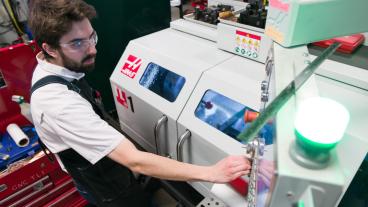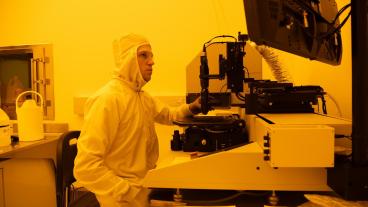The Physics Department’s perpetual quest to improve how it educates students is moving into largely uncharted territory: graduate-level classes.
Inspired and informed by the department’s innovative teaching faculty, three years teaching in the McBride Honors Program, and his own longtime interest in pedagogy, Professor Lincoln Carr set out a year ago to revamp a course in classical mechanics to better prepare students for the intensive research that will make up the bulk of their graduate school career.“Our mean time nationally for a physics degree is already approaching seven years and increasing,” Carr said, with one out of five needing eight years or more to earn their PhD. One issue he sees is the way that path is normally structured in the U.S.
“They do two years of classes – it’s this block where many faculty, including me, have tended to repeat what their great masters taught them. And then they do research,” Carr said.
“My idea was to have them start on research on Day One in the classroom,” Carr said. “They all got shop-certified, they got electronics lab-certified, they had to build an apparatus and explain it.”
Carr kept lectures to a minimum, employing a buzzer that sounded after 10 minutes, signaling that it was time for him to sit down. The students themselves never sat down for more than 10 minutes, always having to “get up and do things, run around and solve problems with one another,” he said.
Carr performed one demonstration to get started, but after that the students delivered most of the presentations, conducting three experiments over the course of the class. “All the theory they learn has to support their experiments,” Carr said.
Carr admits that the sample size is small – just six students – and he doesn’t have extensive data, but he does have at least one impressive number he can point to. “The biggest point of success with the students is that they all had real research offers at the end of the first semester, instead of waiting around until sometime in the second year, which is typical,” Carr said.

One of the pendulum rod devices students built in Lincoln Carr's classical mechanics course.
He also noted the results of a mini-research project he had assigned to students both in his traditional classes and this experimental course. “Every student in this class wrote a better analysis than the best student from my three years teaching the traditional class previously,” Carr said. “They understand things much more deeply.”
Another hallmark of this class was collaboration. “So what the students did is they figured out who was really good at [the coding language] Python, who really understood measurement theory, who was good at systematic error, and then they would consult with each other,” Carr said. “And that was a natural process – I didn’t have to force it at all.”
It’s a big change from the typical method of taking exams and then being scored on how well you do compared to the next person, “which has nothing to do with the work world or anything else,” said Carr. “They really learned from each other; no way I could have taught all this.”
Class homework was also less regimented. Instead of saying “Solve problems A, B, and C,” Carr might ask students to find out about a certain topic, invent some of their own problems, and then solve them. The class would then critique the results, with another student eventually asked to review them similar to a journal paper.
Assignments were kept in something called a “discovery notebook,” a technique adapted from a McBride course Carr taught with Liberal Arts and International Studies Teaching Professor Toni Lefton – basically, an artistic portfolio ported into a scientific context. Students collect highlights of their discoveries, analyses from lectures, smartphone photos, etc.
Carr credits the leadership at Mines and in the department with laying the groundwork for improving teaching across all levels, investing in full-time teaching faculty instead of hiring and firing affiliate faculty depending on class sizes. He said Physics department heads he has worked with, from Professor Emeritus James McNeil, to University Professor Emeritus Thomas Furtak, to Professor Jeff Squier, the current DH, have been supportive of faculty efforts to improve teaching.
“As we strive to better prepare our graduates for successful careers, it is key that as a department we continuously engage in pedagogical practices that are truly enabling,” Squier said. “Professor Carr’s work in graduate mechanics is an excellent example of this ongoing process.”
Carr cites teaching faculty Kristine Callan, Vince Kuo, Pat Kohl, Todd Ruskell, and Bethany Wilcox, the department’s newest member, as national experts in physics education research whose expertise in undergraduate teaching has influenced research-focused faculty in Physics and across campus.
“They’ve percolated these modified techniques, clickers, flipped classrooms, peer-to-peer interaction, collaboration instead of competition – they’ve been such an influence,” Carr said. Young, award-winning tenure-track physics faculty such as Susanta Sarkar and Eric Toberer are enthusiastic about experimenting with teaching ideas in graduate classes because of this environment, and Carr’s graduate students have sections in their theses about education.
Carr recently gave an invited talk on this experimental class at the annual meeting of the American Physical Society’s Division of Atomic, Molecular, and Optical Physics, where it was cited as one of the gathering’s highlights. He plans to teach another year of the class this fall. “I want to show it works at least twice,” Carr said. “Then I’ll write an American Journal of Physics paper about it. These students just blew me away.”
Contact:
Mark Ramirez, Communications Manager, College of Applied Science & Engineering | 303-384-2622 | ramirez@mines.edu
Deirdre Keating, Communications Manager, College of Engineering & Computational Sciences | 303-384-2358 | dkeating@mines.edu



